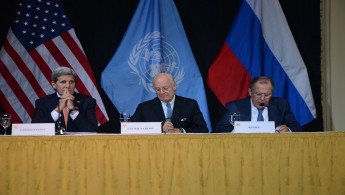The Syrian opposition struggles to remain relevant
The latest round of Vienna talks on Syria, held on 14 November, has presented a number of challenges for the Syrian opposition as it tries to remain relevant to the decisions being made about the fate of their country by world powers.
The talks resulted in an agreement to start a transitional political process in Syria within six months that would lead to elections within 18 months, however the fate of Syrian President Bashar al-Assad remained undecided.
The talks also resulted in a decision to hold direct negotiations between Syrian opposition factions and the regime in January, which is the opposition's greatest challenge, as it needs to race against time to present a united negotiating team.
| The SNC seems to be in a race against time to achieve its goal to represent Syria's armed factions |
Another challenge will be the decision concerning the rebel factions that will be included on the list of terrorist groups operating in Syria along with the Islamic State group (IS) and al-Nusra Front, in addition to the implementation of the comprehensive ceasefire.
A senior opposition figure told al-Araby al-Jadeed that the Syrian National Coalition (SNC) was promised by several European countries to be given a leading role in process a week prior to the latest Vienna meeting.
Despite not representing all opposition factions, the SNC remains the largest coalition of Syria's political opposition and it is in the process of including the largest number of armed factions possible, which would grant the SNC additional weight according to the opposition figure.
On Monday and Tuesday, the SNC held meetings with the major armed factions in order to create a new military council belonging to the SNC, and have the opposition coalition be the political representative for those armed factions.
The meetings included all the major armed groups with the exception of Ahrar al-Sham and al-Jabha al-Shamiya, and an agreement on the new military council is expected to be reached by Thursday.
The SNC seems to be in a race against time to achieve its goal to represent Syria's armed factions because that would give it additional weight at the negotiating table.
Furthermore, the rebel factions have started to realise the seriousness of world powers in their attempt to find a political resolution to the Syrian crisis, and have begun looking for political representation that could keep them relevant in the transitional period and keep them off the "terrorism" list.
Mixed reactions
"The Free Syrian Army [FSA] has requested an explanation to some of the decisions reached at the Vienna talks, primarily the fate of Bashar al-Assad, which is the greatest point of contention," said Abu Salih, the commander of the FSA's Aleppo based al-Sultan Murad brigade.
Abu Salih said he supports any political solution that would end the suffering of the Syrian people so long as it does not include Assad.
| Colonel Riad al-Asaad believes the Vienna decisions are insulting to the Syrian people as they are an attempt to rehabilitate Bashar al-Assad. |
However, the founder of the FSA, Colonel Riad al-Asaad believes the Vienna decisions are insulting to the Syrian people as they are an attempt to rehabilitate Bashar al-Assad.
"In their current state, the decisions cannot be implemented and they will pave the way for a prolonged conflict. These decisions are very dangerous to the present and future of Syria," said al-Asaad.
"How can they be implemented when Syrian is a country occupied by the Russians and Iranians?"
A commander of one of the rebel factions who wished to remain anonymous expressed doubts about the implementation of a comprehensive ceasefire, which he believes is still vague.
"What are the guarantees that would stop the Syrian regime from bombing markets and residential areas, and stop its continued use of barrel bombs despite a UN resolution banning this indiscriminate weapon since 2012?"
Meanwhile, the Syrian opposition is betting on the stern positions of its allies, specifically Saudi Arabia and Turkey who oppose the inclusion of Assad in the future of Syria.
Saudi foreign minister Adel al-Jubeir reiterated his country's position after the Vienna talks on Saturday by stressing its support for the Syrian opposition and that a military option remains on the table to topple Assad.
Turkish foreign minister Feridun Sinirlioglu, meanwhile, stressed that Assad should not stand in the elections that have been proposed after the transitional period.



